With more than six million members between them, the National Trust and English Heritage are the major forces behind the British tourism industry.
Hundreds of castles, country houses, abbeys, gardens and beautiful places are under their management, but which offers better value for money?
As spring comes to life, Telegraph Money compares the cost of memberships, the benefits that come with them and how you can save.
How prices compare
National Trust
The National Trust introduced an inflation-busting 8.5% price increase on membership fees on March 1, while English Heritage is forecasting a 4% increase from March 23.
At current rates, an annual National Trust pass is £22.20 more expensive than English Heritage membership, while lifetime membership is a hefty £545 more expensive.
The Trust says it is "acutely aware of the pressure on people's finances" but believes the new fees "provide fantastic value for money".
The increases, which have seen annual adult membership rise from £84 to £91.20, came after a 9.4% increase in 2023.
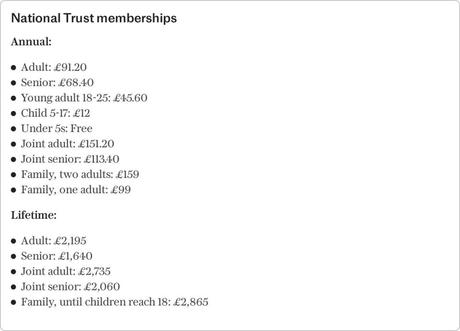
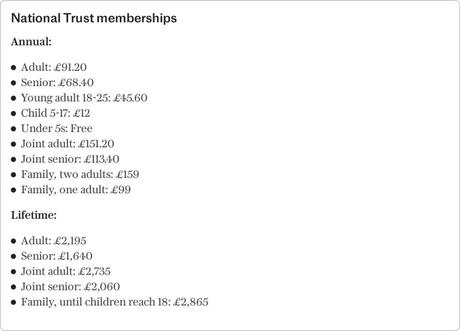
To qualify for the National Trust's reduced senior rate, you must be over 60 years old and have been a member for at least the last three consecutive years.
A new member aged 60 is not eligible for the senior rate and must pay the standard adult rate, which costs 25% more.
Membership includes the additional bonuses of free parking in most of the 800 parking garages, a handbook and a magazine three times a year.
English heritage
Like its counterpart, membership will undoubtedly save you in the long run if you plan multiple visits per year, or even throughout your life.
For example, a family ticket bought at the gate of Dover Castle, Kent, on a summer weekend will cost £92, or £83.60 without a donation. The hefty fee approaches the price of £120 for an annual family membership. Therefore, if popular English heritage sites are on your to-do list, an annual pass makes more financial sense.
A non-member purchasing an adult ticket at the Stonehenge gate can pay up to £37.
The story continues
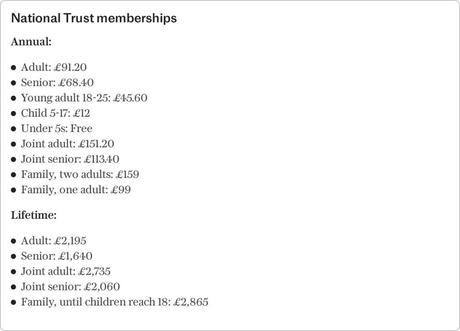
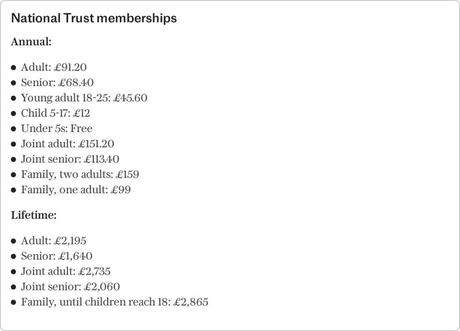
From March 23, membership prices will increase by 4% - in line with current inflation. An annual adult pass will rise from £69 to £72, while lifetime membership will rise from £1,650 to £1,725.
Anyone who registers will receive a handbook and will receive a member magazine and an e-newsletter.
During the second week of April, members will enjoy free entry to events at English heritage sites across the country, virtual events and a 20% discount in gift shops and cafes.
National Trust attracts five times more members
The Trust, the country's largest members-only charity, dwarfs its rival in terms of membership and recruitment.
Bosses said they were "pleased" after keeping visitor numbers steady at 5.7 million last year. However, the charity fell one million short of its target of attracting 25.1 million visitors through ticket sales. The numbers were also below pre-pandemic levels.
By comparison, English Heritage attracted 5.4 million visitors to its paid sites last year, a fifth of the Trust's total.
As for its members, it has a total of 1.2 million.
The type of sites on each
Every seasoned visitor will have their favorite between the two. Lovers of formidable Norman castles will prefer English Heritage, while fans of majestic aristocratic houses will most likely support the National Trust.
Of the approximately 400 sites managed by English Heritage, 98 charge an entrance fee.
Become a member and you'll get value for money in the North East. North Yorkshire and Northumberland both share 24 ticketed attractions.
Kent, Cornwall, Cumbria and London have six each, but the home regions north and west of the capital are bereft of English heritage sites. Berkshire, Buckinghamshire and Cambridgeshire do not have paid sites.
As for the National Trust, the charity hasn't told us how many of the 500 or so sites charge entry fees.
In stark contrast to English Heritage, Buckinghamshire has the highest number of Trust properties. The east of England, especially Lincolnshire, and parts of the north have a limited number of locations.
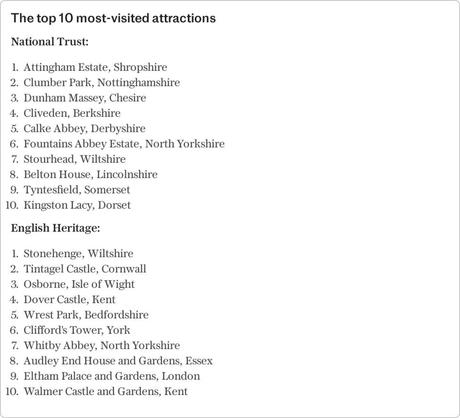
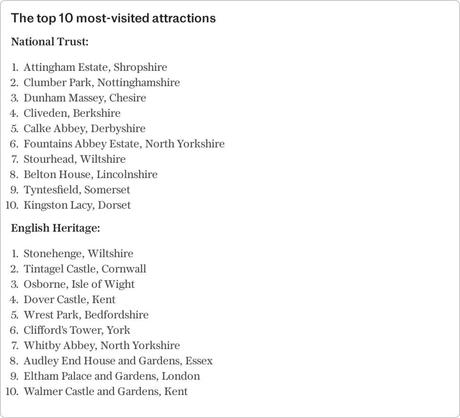
How to save on membership costs
Little known discounts on membership prices are available for those who do not purchase directly through the National Trust or English Heritage.
The most quirky thing is to take out an annual membership of New Zealand Heritage. It may be the furthest country from Britain, but a New Zealand membership can save a Brit up to £111 a year on attractions here.
A Kiwi Heritage Pass not only gives you access to historic sites in New Zealand, but also to British National Trust and English Heritage sites.
An annual membership for adults can be purchased by a non-Kiwi for just £96 (NZ$200). If you buy both the English Heritage and National Trust passes it will cost £160.20.
For family tickets, a NZ membership costs £168. If you buy them individually here it costs £279.
Pete Chatfield, of Household Money Saving, said the discount trick is one "not many people are aware of".
"It is a very good saving that everyone can use. You don't have to be New Zealander to buy it.
"The only thing you need to be aware of is the fact that you don't have parking coverage, so you may have to pay for it at certain English Heritage and National Trust sites."
Another money-saving hack is to use the National Trust for Scotland's cheaper rate.
Scottish membership per adult costs £69.60 and gives access to all National Trust sites elsewhere in Britain. This equates to £21.60 cheaper than joining the English branch of the Trust.
As with the New Zealand trick, you don't have to be a resident of Scotland to sign up.
Mr Chatfield also recommends taking advantage of the English Heritage discount offered by the CSSC (Civil Service Sports Club). Annual membership of the CSSC costs £59.88, and one of the key benefits is free entry to all English Heritage attractions.
"A year's membership costs just under £60, so it can be a big saving," said Chatfield.
"Although it is called the Civil Service Club, you do not have to be a member of the civil service. You need to know someone who is currently a member, and they can refer you so you can join.
"As a family you will then receive free access to English heritage sites."
RecommendedThe loophole that gives £100 off memberships to the National Trust and English Heritage
read more
'Wok' controversies
In recent years the National Trust has faced increasing anger over a series of decisions that have sparked claims that it is following a 'woke agenda'.
Bosses have been accused of 'being stupid' by removing important items from display and turning historic houses into 'theme parks' designed for children.
There was also a significant backlash after it emerged that Christian holidays had been excluded from the Trust's 'inclusivity and wellbeing' calendar.
Telegraph readers told us the National Trust was "lost forever" over its management, while others warned the charity would effectively go "woke, bankrupt".
Membership can save on parking
It's more likely that you've come across a National Trust car park at a popular beauty spot.
Locations such as the White Cliffs of Dover charge for parking, but the sites are free to use for members.
If you are a regular user of such car parks, membership can be a smart option.
In the Lake District, for example, there are several National Trust-run car parks that charge up to £9 for stays longer than four hours. If you're planning a walking holiday around the Lakes, plus the occasional visit to a country house at some time in the year, an annual membership is probably worth it.
What to pay attention to
A large number of attractions are not open all year round, meaning members who want to take advantage of quieter off-peak days may be disappointed.
Even the most popular attractions, such as Dover Castle, are partially closed during winter, only open on weekends between November and mid-February.
Meanwhile, smaller properties are only open a day or two a week year-round. If you want to visit a specific place or object, first check whether there is any temporary closure or restoration work.
How to compare cream tea prices
Cream tea, a quintessentially English treat, is a staple on the menus of stately homes and castles.
The cost of enjoying a drink and scone varies between English Heritage and National Trust, with the latter charging £1.35 more.
Both use general prices on their sites:
-
English Heritage: £5.95 - includes tea or coffee, jam, clotted cream and fruit or a plain scone.
-
National Trust: £7.30 - includes a regular drink, jam or honey, clotted cream and a fruit or plain scone. Choosing a larger drink costs €7.50.
The National Trust has a significantly larger number of cafes, with 280 across the UK.
At English Heritage, a loyalty scheme offers members a 10% discount in pubs and shops after the first annual renewal.
The lesser known membership of Historic Houses
Founded 50 years ago, Historic Houses is a lesser-known association that manages some of Britain's most impressive heritage attractions.
Alnwick Castle (of Harry Potter fame), Highclere Castle (of Downton Abbey), Hever Castle, Holkham Hall and Arundel Castle are among the vast array of properties managed by the group.
Around 1,400 houses, castles, gardens and parks are managed by Historic Houses, where annual membership for adults costs £68.
A joint membership costs £108, and although no family passes are available, additional adults or children can be added for £30.
What do you prefer: the National Trust or English Heritage? Join the conversation in the comments below.